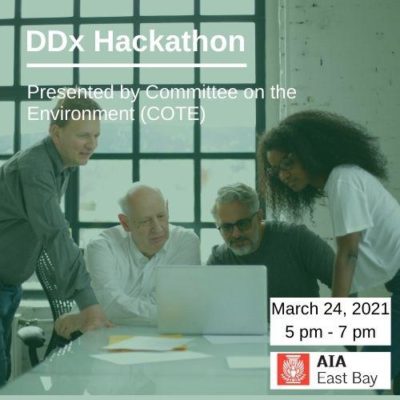
AIA 2030 Commitment – the DDx Hackathon
<< All EventsAIA 2030 Commitment – the DDx Hackathon
Speakers/Expert Hackers:
- – Gwen Fuertes, AIA, LEED AP BD+C, Associate, LMS Architects
- – Seth Dunn, Siegel & Strain Architects
Please join us for the second of a 2-part series inviting all Architectural firms to join the AIA 2030 Commitment to design 100% of our projects to zero carbon by 2030. Come learn how to use the AIA’s recently updated Design Data Exchange (DDx) online platform tool to report on your annual progress toward the goals. COTE DDx experts will walk you through the process, identify the data required for entry (& optional methods), show actual samples in a live demo and answer questions. This interactive event will take a deeper dive into the DDx and provide:
- – Basic steps to navigating the updated DDx and annual reporting on the AIA 2030 Commitment using the online DDx platform
- – How to avoid common DDx errors
- – Hot tips about use of the Research tab in the DDx
- – Other Handy Resources
- – A lively DDx Hackathon with expert COTE/DDx Advisors—we will use Breakout rooms by building project types for the latter half of the session.
Come prepared with your DDx reporting questions and let’s get this hacking started! (Bring your firm DDx login if you want to work on your reporting online during the Hackathon!)
Things to bring to the DDx Hackathon on March 24th:
A. Basic information: Project name, address/location and type, Gross Sq. Footage.
- – Breakdown Gross Sq. Footage by use type, ie. Office, Storage, Meeting Hall, etc.
- – For multi-family residential you will need number of units, and units per floor, as well as number of bedrooms etc.
- – See complete list of use types on the 2030 DDx or by using the Zerotool calculator at Zerotool.org
B. Any Title 24 energy compliance reports or other energy modeling results for predicted Energy Use Intensity (pEUI).
- – The ECON-1 and PRF-1 Table U are tables that list the annual kwh and therm use. You must ask your mechanical engineer or T-24 consultant for these forms as they are not typically provided as part of T-24.
C. Any information about any on-site solar generation system size/ output (optional as applies). Signed agreements to purchase power from a community service provider such as MCE or East Bay Community Energy also qualify.

